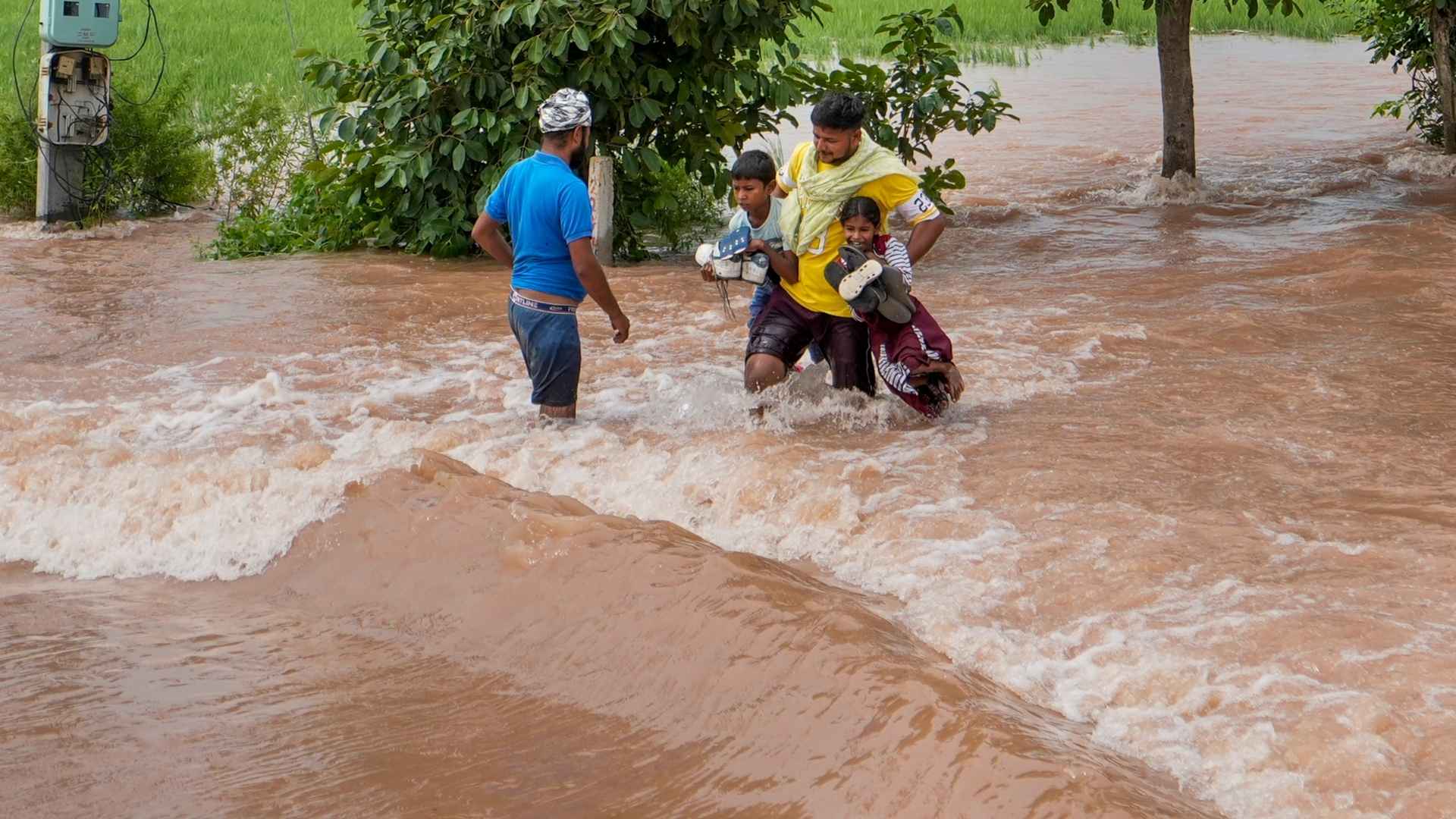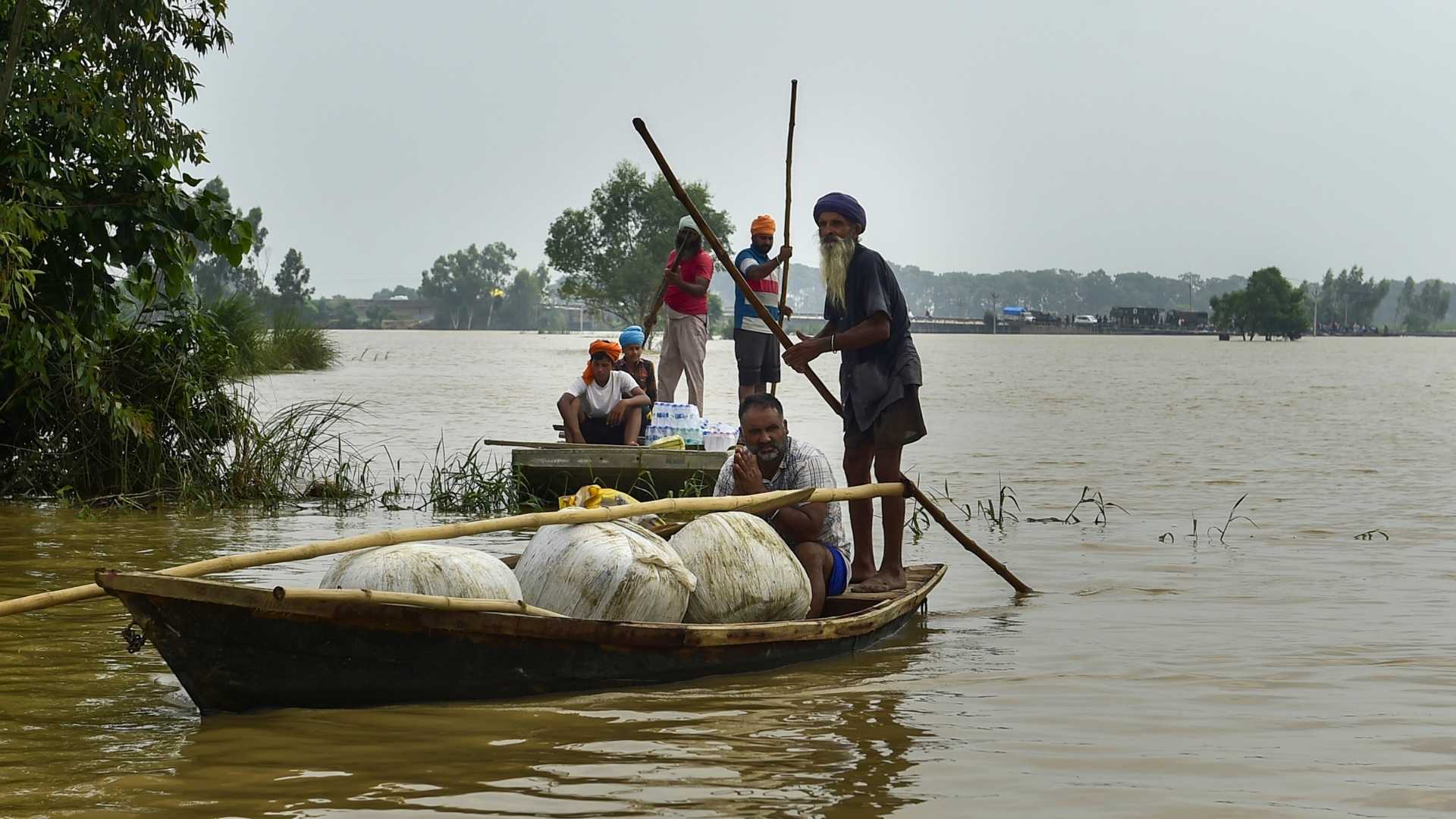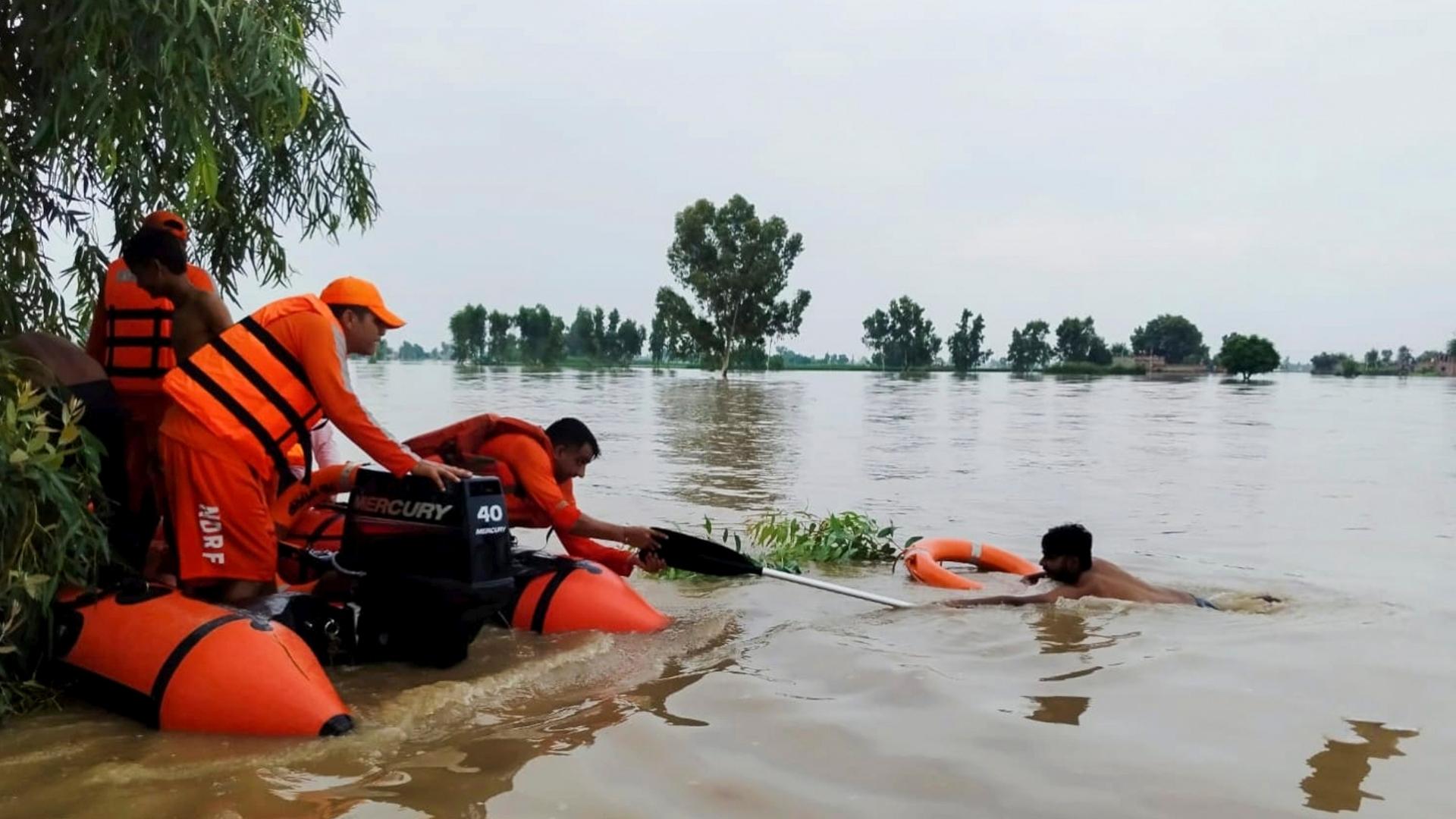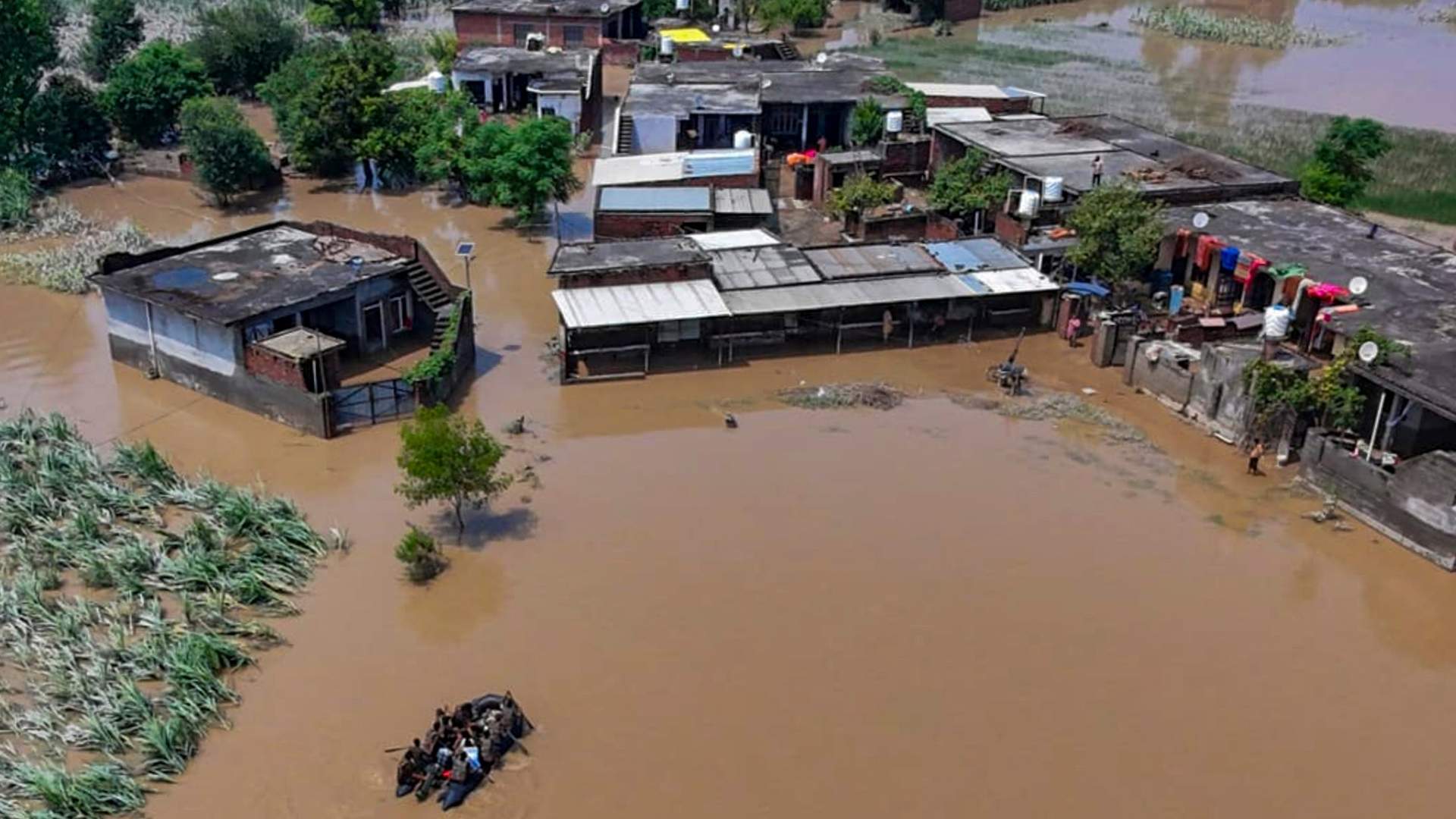Trending:
Who drowned Punjab? Not the bureaucrats
The bureaucracy and police enjoyed unbridled powers during the militancy era in absence of political executive. The hangover continues. Bureaucracy and the police exploit the vulnerabilities, weaknesses, and animosities of the political executive to serve their own ends.- Chandigarh - UPDATED: September 3, 2025, 01:53 PM - 2 min read

NDRF personnel during a rescue operation at a flood-affected area, in Punjab.
In 2012, when Parkash Singh Badal in a surprise development returned to power beating all forecasts and predictions about anti-incumbency against his previous term, he made a pithy remark about senior bureaucrats and police officers.
Though Punjab had maintained a trend not to return the incumbent government, the situation was not clear till the results were declared on March 6. Badal, after taking oath for the fourth time as the Chief Minister and for the second consecutive term, taunted the officers, from administration and police, that they had parked their cars at Barnala, which falls about midway between Patiala and Bathinda as they were not sure which way to go.
In case the Congress won, they would need to go to Patiala to meet and greet Capt Amarinder Singh. And in case Badal returned to power, they would need to go to Badal village near Bathinda to greet him. This was a telling comment on the “negotiable loyalty” of the bureaucrats and it was so true. But that is the best they are at, adjusting their sails according to the winds blowing.

The bureaucratic administration has been structured in such a way that no political executive can overrule it, although it should be the other way round. Over a period, particularly in Punjab, such a system has evolved that bureaucrats wield ultimate power without any accountability. The same is true about the police. This is mainly because the bureaucracy and police enjoyed unbridled powers during the militancy era in absence of political executive. The hangover continues. Bureaucracy and the police exploit the vulnerabilities, weaknesses, and animosities of the political executive to serve their own ends.
When a senior IAS officer was booked by the Punjab Vigilance Bureau in a case related to unauthorised change of land use, the entire bureaucracy went up in arms against the current Aam Aadmi Party government and eventually it had to slow down, abandon action, and even warn the vigilance bureau about it. While all other accused, including a former minister and several non-IAS officials faced jail, the particular bureaucrat remained untouched.
So how dare a Punjab legislator question the competence and efficiency of a senior bureaucrat and hold him responsible for the devastation caused by floods in parts of Punjab. The criticism by the particular legislator, who belonged to the ruling party, was apparently aimed at the bureaucracy, but it was interpreted as against his own government. That is what the bureaucracy is best at; ganging up against a common enemy.
Also read: Like Kashmir, Madhopur Barrage reason India retained Gurdaspur
This resulted in the application of the ‘standard operating procedure’ in such situations. A pending case against the legislator has been reopened and the police are doing a “follow up”. He is reported to have escaped the police custody after being arrested.

In the entire process, at least for one day, the devastation caused by the floods went into the background and the action by the government against its own party MLA hit the headlines.
But action against the complainant legislator cannot deviate the issue of fixing the responsibility and accountability for the devastation caused by the floods. It indeed is a “natural calamity”. What were the precautionary measures taken against such a calamity and that too when there was already an advance forecast of “above normal” monsoon with likelihood of heavy rains? After all, there is also a flood control department working within the government, again headed by a bureaucrat, like all other departments.
Integrity of the officials is understandable and acknowledged, but mere integrity and reputation cannot be a substitute for efficiency. Somebody at the helm has to be held accountable. Some heads have to roll. People have been drowned in floodwaters and everybody is going scot-free. In the process, the messenger (the legislator) has been shot.
Also read: Punjab floods: Rivers overflow, thousands displaced, 30 dead
Political rhetoric by the opposition parties aside, the Chief Minister or his ministers cannot be exclusively held responsible for failing to visualise the situation. After all, at the ground level it is the bureaucracy with unbridled authority and powers at its command, which is responsible for taking day-to-day and on the spot decisions. What has been observed during recent floods is that the bureaucrats and police officers are indulging in “competitive optics” with politicians by wading through flooded waters.

Tackling floods is not a “policy decision” that one needs to wait for “government orders”. After all, what are all the bureaucrats there on the ground for, with so much authority? Why can’t and why should they not be questioned and held accountable for all the omissions and commissions that led to large parts of Punjab drowning in deluge. Integrity cannot be a defence against inefficiency, incapability, and negligence.
Put a politician in that position. S/he is held to the highest standards of performance. S/he will be removed and replaced immediately. Even if s/he survives, s/he will have to face the people in the next elections within a span of less than five years. There are no such periodical “reviews” for bureaucrats’ (non)performance.
The bureaucracy is at the core of governance and administration in India. The bureaucrats are the most powerful people and the least accountable ones. Holding a bureaucrat accountable is the “rarest of the rare” thing in India. An impression has been created that they are absolutely infallible, “incapable of committing mistakes”. A bureaucrat’s personal growth is always linear. S/he necessarily rises to the top of the ladder, irrespective of the track record. Because, there are no demotions or electoral rejections for the bureaucrats as once they are in the service, they are supposed to be infallible and incapable of committing any mistakes or doing anything wrong. They are no less than demigods.

With over-centralisation of power and authority in a single person, both at the centre and the states, the “central figure” exerts all control through the bureaucrats. S/he uses bureaucrats to cut to size his political colleagues particularly those whom s/he deems as his/ her rivals. The ministers are often aggrieved as the bureaucrats who are supposed to work with/ under them, exert more authority for their proximity to the “central figure”. This has been happening in Punjab for a long time. This was true of the Congress regime and this is true of the AAP regime as well. Yes, before that, the Akali leadership, both Parkash Singh Badal and Sukhbir Singh Badal, did exert political authority over the bureaucracy, but only to a limited extent.
Politicians are most infamous for “corruption”. Of course, there are so many corrupt people among them. But here also their level of corruption is no match to bureaucratic corruption. There is a continuous and never-ending argument as to who wields more power, a bureaucrat or a politician (in power).
Also read: Army rescues over 5,000 civilians in Jammu, Punjab, HP
An estimated 80 per cent of politicians get just one chance rather than one term of five years in their lifetime to wield power for whatever they want. Compared to that, a bureaucrat or for that matter any government official, has an assured and secure tenure of 30-35 years and their power keeps on increasing with every passing year. When they retire, most of them get post-retirement benefits. All through their service, they enjoy super-luxurious perks rivalled only by the richest of the rich. They live in big government houses, have chauffeur driven cars, servants, and security and what not.
A significant number of bureaucrats have either their kin, kids or friends into “business” and doing so well. The financial progress of the kin/ kids/ friends always corresponds to the rise of the particular bureaucrat in position. This is not to say every bureaucrat or police official does that. There are so many scrupulously honest officers with exemplary integrity. But the majority belongs to the former category.
One of the most interesting examples about the difference between politicians and bureaucrats, in terms of power and wealth they enjoy and gain, is two housing societies, on the outskirts of Chandigarh. One of the societies consisting of a huge land parcel with a sprawling colony spread over hundreds of acres, is exclusively for the bureaucrats and police officers of Punjab cadre. This “settlement” is right at the Punjab-Chandigarh border.
Beyond that a few kilometres towards Punjab, there is another housing society consisting of a few multi-storey towers with residential apartments, belonging to sitting and former members of the Punjab Legislative Assembly.
Here lies the difference. While the politicians could barely manage an apartment each, the bureaucrats are living in huge multi-story houses with sprawling lawns, and wide roads in front and the back, not difficult to guess, worth how much.
That probably explains the best as to who earns more and makes more money, by whatever means; a politician or a bureaucrat. While a politician is held accountable and answerable for every act of omission and commission at every step, a bureaucrat enjoys an immunity that lasts a lifetime, not just his/ her service tenure.
So why does any bureaucrat need to bother or care even when Punjab has drowned in deluge thanks to the bureaucratic sloth and inefficiency, as long as they enjoy immunity, while politicians continue to be flogged.
Also read: Punjab AAP MLA held on rape charges escapes after firing at cops
Punjab’s bane is its sloth-stricken bureaucracy in perpetual inertia without any accountability. Entire Punjab drowning in floods is just one symptom of this collective bureaucratic failure. Punjab is drowning on other fronts as well - financial, economic, social, agricultural, industrial and nobody bothers as nobody is responsible and accountable.

